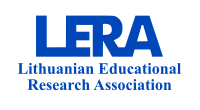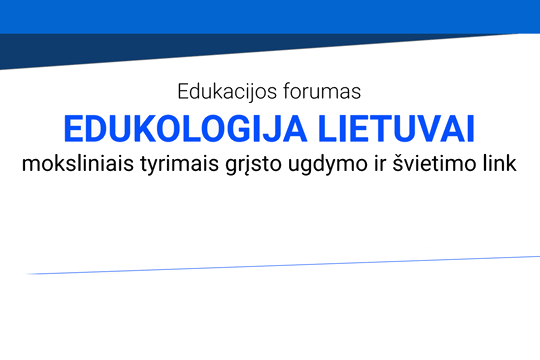XXXV EDUCATION FORUM
EDUCATION FOR LITHUANIA – RESEARCH-BASED EDUCATION
TOWARDS RESEARCH-BASED EDUCATION AND TRAINING
Theme
“Research-Based Practices in Primary Education Through the Eyes of Young Teachers”
We are kindly remind and invite to attend the Primary Education Researchers’ Network Forum, where you will hear the results of the research carried out by young researchers, primary school teachers. Also, we will share insights on why it is important for every teacher to have strong research organisation skills, the value of research-based educational practice, how it relates to the organisation of the educational process and what can be done to ensure that all primary teachers develop this competence. The panellists will not only share their experiences of what they think research-based primary education practice means, but also how educational content is developed, and what methods and tasks help to ground primary school pupils’ activities in research. The Forum will provide opportunities for all participants who are interested in the practice of primary education in Lithuania to speak, ask questions and seek answers.
| Date | 20 November 2024 (Wednesday) |
| Time | 3.00–5.00 p.m. |
| Broadcasting | |
| Moderator | Prof. dr. Daiva Jakavonytė-Staškuvienė |
Issues discussed at the Forum Key-note speakers and panellists
1. Developing children’s creativity through information and communication technologies in primary school
Abstract: This presentation explores the concept of creativity and presents research findings that reveal the potential of developing children’s creativity through ICT in primary school. The participants in the study are five primary school teachers and five parents, who pay particular attention to the development of creativity through the use of various ICT tools, continuously improving their competences in this area.
Author: Kristina Saveljeva, Klaipėda University
Scientific supervisor: prof. dr. Rasa Braslauskienė, Klaipėda University
The empirical study highlighted the following opportunities for teachers: a) freedom of choice; b) variety of means and tools; c) express themselves; d) attract attention; e) encourage children’s independence; f) integrate into the educational process; etc. The qualitative research revealed parents’ perception of the following opportunities for children to develop creativity through ICT in primary school: non-traditional lessons; lessons in the parents’ workplace; collaborative projects; work with the child; creative freedom, experimentation; role models, etc.
2. Developing the speaking skills of third-grade pupils through bilingual analysis of visual material
Abstract: Often in language classes, students’ speaking skills are less often developed and are left behind, so it has been explored how to develop students’ bilingual speaking skills with the help of visual material. The content of the presentation answers the question: How does the analysis of bilingual visual material develop the speaking skills of third grade pupils? In order to find out whether bilingual visual material analysis is a favourable method for developing students’ speaking skills, an action research study was carried out in which students analysed visual material in bilingual lessons and in lessons where the two languages were integrated.
Author: Guostė Streikutė, Vytautas Magnus University
Supervisor: prof. dr. Daiva Jakavonytė-Staškuvienė, Vytautas Magnus University
3. Using timeline activities to understand historical time in year 3
Abstract: This presentation explores how timeline tasks in the classroom contribute to the development of students’ basic historical literacy skills in grade 3 of primary school in the context of historical topics. Based on the theoretical material studied and on a model of growth in historical time-awareness developed by Dutch researchers, an action research study was carried out in a school in Vilnius, Lithuania, involving 29 third graders. The study involved 16 educational activities: one class (X) was targeted with timeline tasks, while another class (Y) was not. Students completed pre- and post-activity questionnaires, the qualitative and quantitative analysis of which revealed a number of trends that are important for improving the educational process and learning outcomes.
Author : Otilija Ožalaitė, Vilnius University
Supervisor: doc. dr. Aušra Žemgulienė, Vilnius University
The results of the study confirmed the effectiveness of the targeted and consistent use of timezones during lessons. This adds to the findings of other research that the systematic use of timeline tasks in the educational process can result in students achieving better results in their understanding of historical time than their peers who have not completed timeline tasks.
Y
| Panelists |
Jurgita Blažienė, Head of Education, Primary School, Vilnius Gediminas City School Irma Dobrovolskienė, expert teacher of primary classes at Vilnius Medeina Primary School Dr. Rasa Kulevičienė, Senior Lecturer, Klaipėda State College Raimonda Petkūnienė, teacher-expert of primary classes at Vilnius Maironio progimnasium, Master of Education Darius Savickas, Primary teacher at Taškius Primary School, Head of Taškius Kindergarten, Master’s degree in Business Management from Educational Leadership Programme Nadia Venskuvienė, Chief Specialist at the Ministry of Education Science and Sports, Lecturer at Vilnius University, Master of Education Linas Vilčinskas, teacher-teacher of primary classes at Kėdainiai Senamiesčio progimnasium |
We invite education practitioners, education and education researchers, postgraduate students, doctoral students, university lecturers, education and social policy makers, representatives of scientific associations and NGOs, and all those who are interested in the implications of education research for educational practice.
Scientific and Organising Committee of the XXXV Education Forum
Assoc. dr. Aušra Žemgulienė, member of LERA Primary Education Network
Prof. dr. Daiva Jakavonytė-Staškuvienė, Member of the LERA Board
Dr. Eglė Pranckūnienė, LERA President
Contact information:
Daiva Jakavonytė-Staškuvienė, daiva.jakavonyte-staskuviene@vdu.lt
facebooklinkedintwitter

